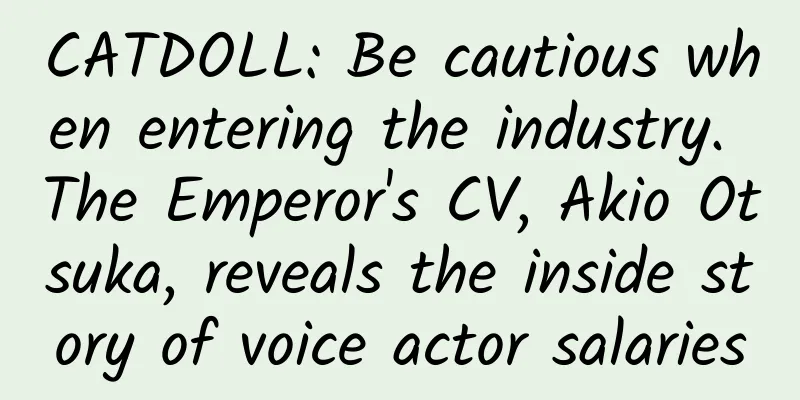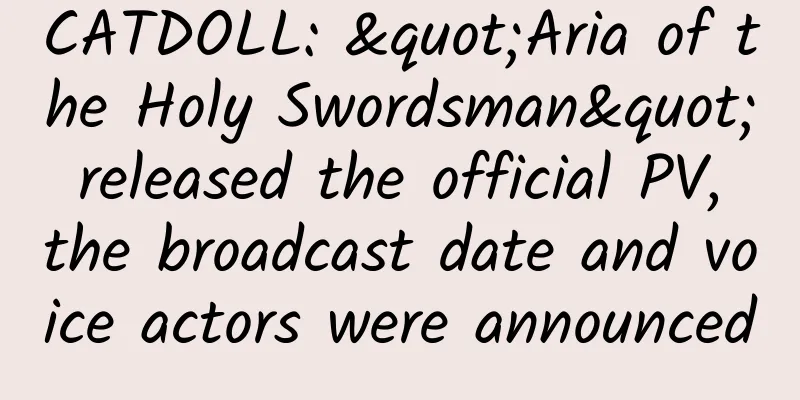CATDOLL: Be cautious when entering the industry. The Emperor's CV, Akio Otsuka, reveals the inside story of voice actor salaries

|
The widespread popularity of Japanese anime culture has brought voice actors who used to be behind the scenes to the forefront. Voice actors are not only dubbing for animated characters and foreign movies and TV series, but are also developing into singers, photo idols, variety shows, and other fields. As the scope of their performing arts continues to expand, voice actors are currently very popular as versatile variety show stars. In the past, even idols and actors who failed to make it rarely turned to voice actors, but recently the number of young people who have chosen voice actors as their development direction has increased dramatically. Many of these young people who dream of becoming voice actors have entered voice actor schools and are training hard every day. However, one veteran voice actor asserted: "The only job I want you to give up is voice actor." The person who made this statement that shattered the dreams of young people is Akio Otsuka, a veteran voice actor who is well-known for his voice acting for Solid Snake in the popular game series "Metal Gear Solid" and Bart in the "Ghost in the Shell" series. In his book "Seiyuu Soul" (published by Seikaishasha), Otsuka explained the grim situation of the current voice actor industry.
First, let's get to know Akio Otsuka. He was born in Tokyo in 1959 and is now 55 years old. His father is Shuo Otsuka, who is also a voice actor. At the age of 23, Otsuka studied drama for one year at the Graduate School of Literature, and then joined the theater company Komatsu-za founded by Hisashi Inoue. From this time on, Otsuka officially started working as a voice actor, and in 1988 he joined the voice actor agency Ezaki Production (now Mouse Promotion). After that, Akio Otsuka officially began to be active as a voice actor in the public eye.
Otsuka, a senior who has been active in the voice acting industry for nearly 30 years, told us that the current voice acting industry is already in a white-hot competition state of "thousands of troops scrambling to cross a single-plank bridge". Indeed, after 2000, the number of animations produced has increased sharply, the number of games with voices has also increased, and the demand for voice actors has become higher and higher. However, the number of voice actors is far in excess of the supply. In fact, in addition to voice actors who specialize in dubbing, there are also many part-time voice actors who do dubbing as part-time jobs. So, how is the remuneration of voice actors determined? In the world of voice actors, there is a strict "ranking system". The so-called rank system is a system established by the cooperative group "Japan Actors and Actresses Association" (Note: similar to China's association-like organization). Voice actors registered in this organization can be ranked according to certain rules and their remuneration can be determined. Otsuka said: "Rankings can indeed reflect a voice actor's career development and popularity, but this does not explain a person's status. This is just a standard for hourly wages" (from "Voice Actor Soul"). Although rankings cannot represent everything, they can still determine how much remuneration voice actors can get. The "beginner level" is the lowest level, with a remuneration of 15,000 yen (about RMB 775.5) per episode. Generally, voice actors who have not registered for three years will remain at this level. After three years, the remuneration varies from level F to level A. For example, for dubbing one episode (30 minutes) of animation, from low to high, the remuneration for newcomers is "15,000 yen", followed by "16,000 yen" and "17,000 yen", and the price increases step by step in units of 1,000 yen (about RMB 51.7). Regardless of whether it is an animation or a movie, the content of the work has basically no effect on the amount of remuneration. In addition, in principle, the standard for paying voice actors should be the length of the work, and the actual working hours and the role played are not taken into account when calculating the remuneration. For example, a new voice actor plays the protagonist in a total of 12 episodes of an animation (each episode is 30 minutes), and the performance fee is 15,000×12=180,000 yen (about RMB 9,306). In the same work, the price will not change if he plays a supporting role. "In addition, if the work is used a second time, a 'reuse fee' will be generated. If it is broadcast on three media at the same time, namely TV, DVD, and the Internet, the final remuneration will be 2.4 times the original remuneration. Taking the previous rookie voice actor price as an example, the original remuneration of 180,000 yen can be increased to about 430,000 yen (about RMB 22,231). Some people may think that 'it's not a lot', but this is the income of 3 months of work." It is difficult for new voice actors to get work continuously, and even if they do get work, they can only get a small amount of compensation because it is the lowest level. From this perspective, voice acting is indeed a very cruel profession. "For voice actors with three years of work experience, there is no upper limit to their remuneration in theory. The most expensive I know of is around 45,000 yen (about RMB 2,326.5). If the price exceeds this, it becomes a free grade system, which means that it changes from being paid by the hour to being paid by the piece." If you continue to accumulate work experience and gain popularity, you can get about three times the salary of a newcomer. But in fact, the "level" is determined by your own declaration. Of course, you can also set a high price for yourself, but it will be meaningless if no one is interested because the quotation is too high. At this point, because the industry has the mentality of "if you set the level too high, you may not get a job", the system that determines the salary by level should be a disadvantage for voice actors. Although the salary of voice actors is not really very high, it is difficult to become a voice actor. Recently, there seem to be many voice actor volunteers who think that "if you want to become a voice actor, you should go to a voice actor vocational school first", but Otsuka pointed out: "That's just self-righteousness." "Almost all of the veteran voice actors who are now considered experts have never been to voice actor school. Of course, some people may say that it is because of the different times. However, among the young people who are now walking on the Avenue of Stars, only a few have been to voice actor school. There are even fewer voice actors who choose to be idols. There should be more people who directly join entertainment companies based on their experience as photo models, child stars, and participating in drama performances, or join entertainment companies through short-term training courses." So, in fact, there is no need to go to a voice actor school. To put it bluntly, going to a voice actor school is just a detour. "Voice actor schools and training classes are very profitable businesses. For the schools, there is no obligation to be responsible for the future of students. Because the school will not sign contracts such as "I will definitely make the students become stars" or "the students will have stable jobs and salaries after graduation", so in a sense, the school is too relaxed." Voice acting is not a profitable profession, but voice acting schools are profitable. This is the reality. In short, I hope that those voice actor aspirants who have the dream of becoming voice actors will not be deceived. By the way, Otsuka joined the voice actor company because his father, Otsuka Norio, asked Natani Rokuro, who was also a voice actor, "Rokuro, can you take care of my son?" In fact, Natani Rokuro did take care of Otsuka in this way - "I will introduce you to all the directors I know. It doesn't matter if you don't do well the first time, I will take full responsibility until you do it the second time." In other words, Otsuka entered the world of voice actors entirely through "connections". Moreover, because his father is a famous voice actor, he has a very strong network of connections. From this point of view, although Otsuka's advice to voice actor volunteers may sound like a vested interest, it is also true that voice actor jobs are difficult to get into and do not make money. Voice actor volunteers should be aware of this cruel reality. |
<<: CATDOLL: Japanese magazine defamed "Love Live!" and was attacked by fans
>>: CATDOLL: Grimmjow returns but is attacked by Nel? Bleach Chapter 625 manga preview
Recommend
CATDOLL: Author of the comic book "Bleach": Cartoonists don't need to listen to editors!
If Japanese comics are serialized in publications...
CATDOLL: Fan-made animated short film celebrates Hayao Miyazaki's comeback 3 minutes review of classics
Previously, the Japanese animation master Hayao M...
CATDOLL: "My Name is Sakamoto and I'm the Coolest" and "Boy Maid" will be broadcast as usual tonight!
According to official news from "My Name is ...
CATDOLL: The next generation female voice actor group. Lady. The second single is confirmed to be released
The second single "Progression" by the ...
CATDOLL: Bleach manga chapter 672 "son of darkness"
The full Chinese version of the 672th chapter of ...
CATDOLL: Interview with "Beauty, Rich and Beautiful" Voice Actor Suzuko Mimori: Anime Changed Her Life
Suzuko Mimori, a new voice actress known as a whi...
CATDOLL: Japan's establishment of a "doujinshi library" has caused controversy and copyright ownership has been questioned
When it comes to comic creation, many unknown wri...
CATDOLL: Theatrical version of "Nap Princess: My Unknown Story" poster released
The theater poster of the movie "Siesta Hito...
CATDOLL: Hirohiko Araki personally drew "JoJo's Bizarre Adventure" Higashisuke appeared in Akihabara
When it comes to Hirohiko Araki, everyone will th...
CATDOLL: "Zootopia" new Chinese trailer "The Godfather" appears and stuns everyone
Disney's latest animated film "Zootopia&...
CATDOLL: "How to Raise a Boring Girlfriend" ED song "Colorful." released the full MV of Misora Sawai
I don't know if you have watched the 0th epis...
CATDOLL: Dragon Ball Super Episode 32 Text Preview: Space War is Imminent
Episode 32 of Dragon Ball Super will begin airing...
CATDOLL: Anime Starry Sky Evening News: The portrait of the author of the real-life makeup photo of "Prison School" is easy to make mistakes
Good evening, everyone. It's time to review t...
CATDOLL: Another bad teammate, Japanese netizens report that "Gundam Iron Blood" promotes negative energy
The Mobile Suit Gundam series has always been abo...
CATDOLL: AKB fans blast the Love Live! movie: There is no story at all
Speaking of various idol groups nowadays, we have...









